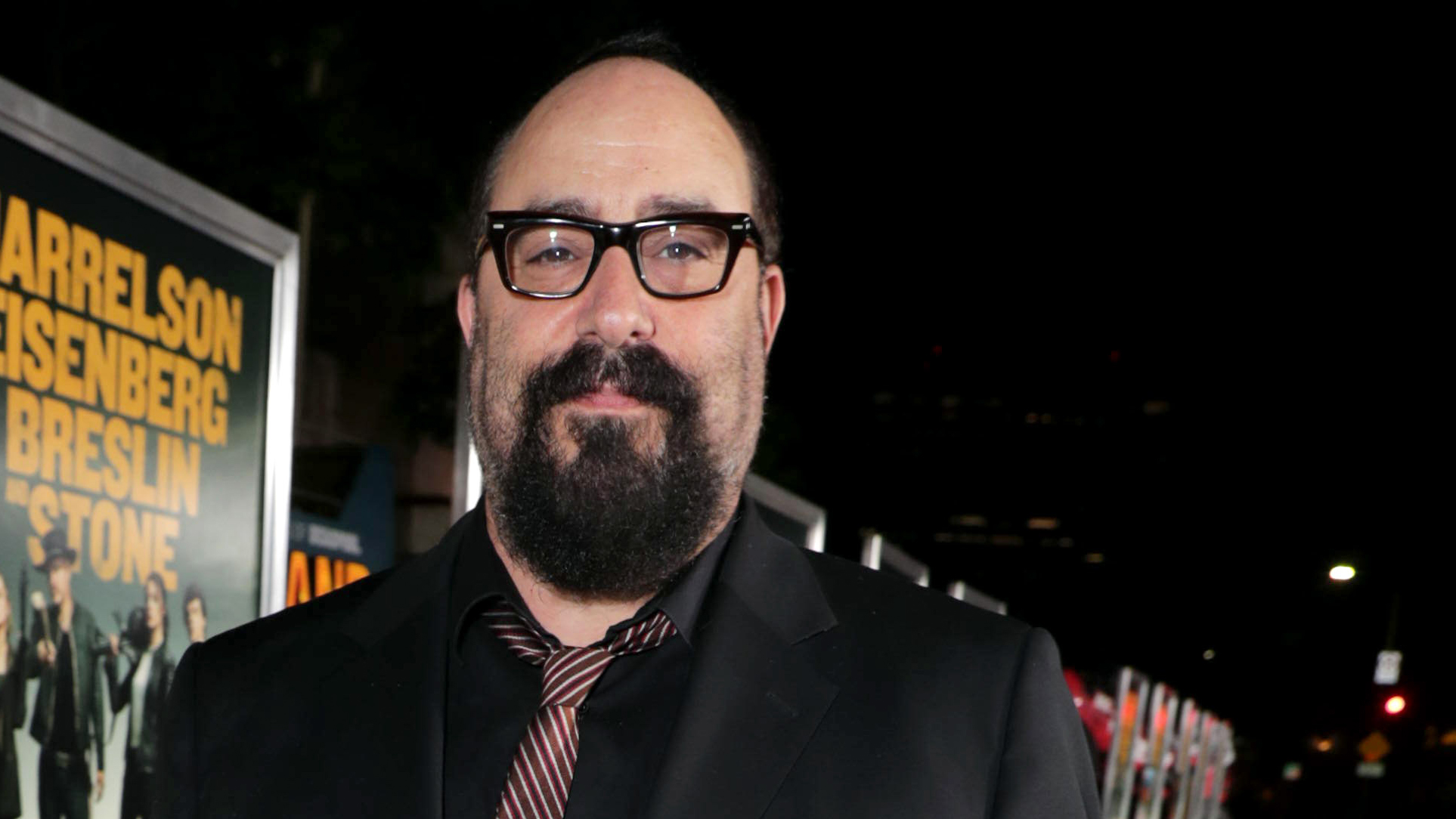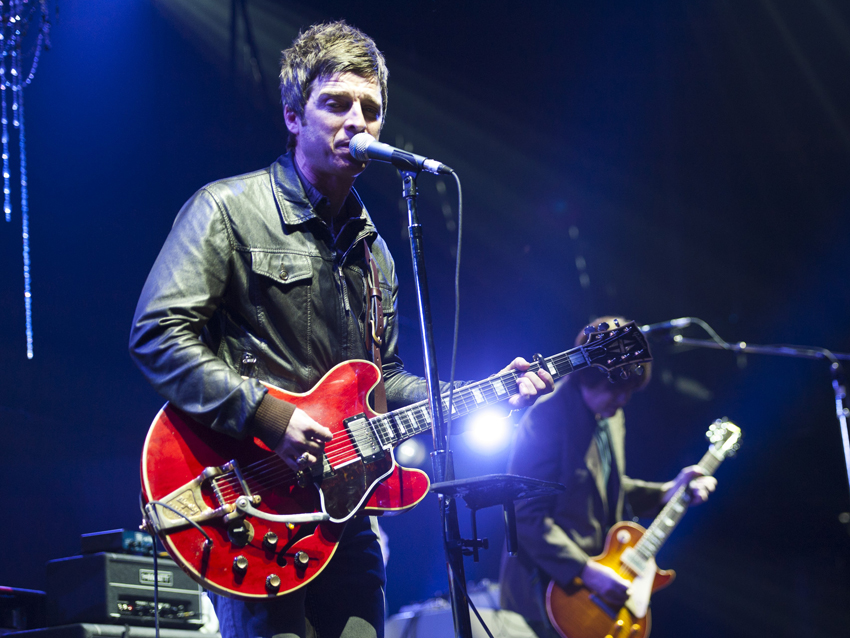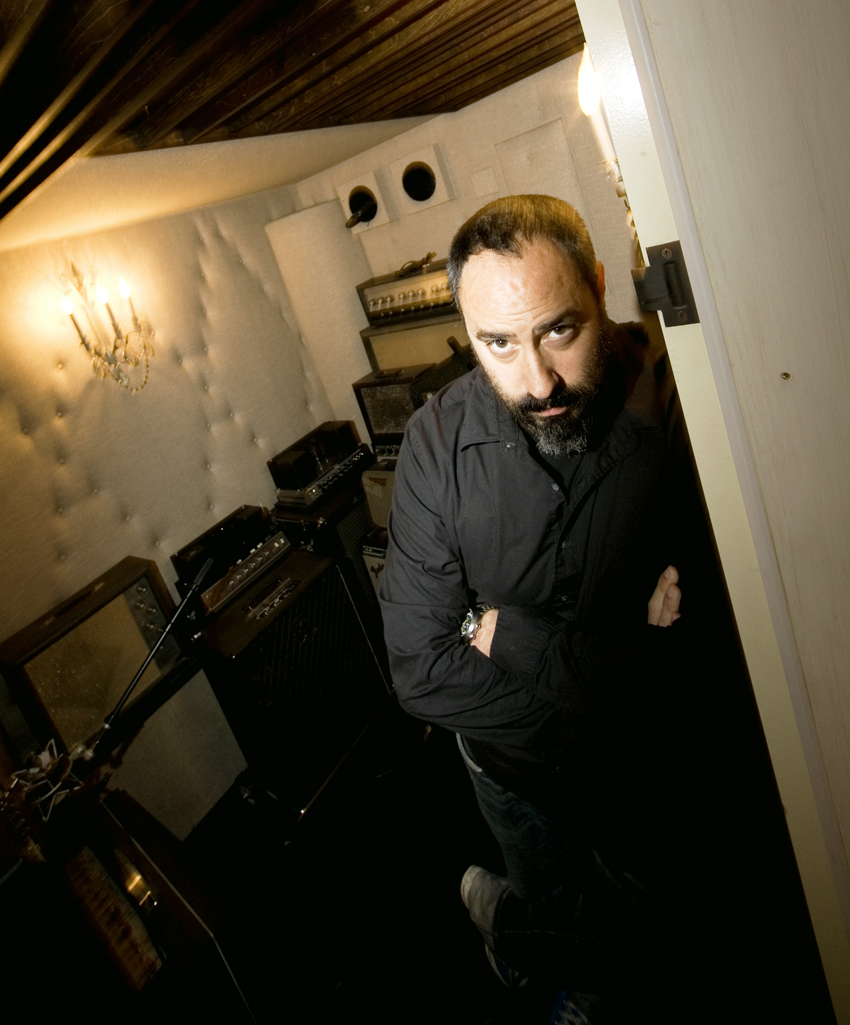
A lot of folks are saying that Noel Gallagher's High Flying Birds is the best Oasis record in 15 years, and if you ask the album's producer, Dave Sardy, there's a good reason for that: "It's because Noel wrote all the songs. Those first few Oasis albums were all Noel, as is this one. So there you go - figure it out."
Sardy's association with Gallagher began with Oasis' 2005 album, Don't Believe The Truth, and continued on 2008's Dig Out Your Soul. But it was on High Flying Birds that the two hit a creative peak. "I've been waiting for this album since I met Noel," says Sardy. "He's unlike any other artist I've ever worked with, except for Johnny Cash, in that he's always writing. Even when he's warming up his voice, he's writing material. So I'm not surprised that this record turned out pretty great."
The Brooklyn-born Sardy started out as a musician, most notably with the group Barkmarket, before moving to the other side of the glass. By the early '90s, he became known as a "hardcore superstar," thanks to his work with bands such as Helmet, Orange 9mm and Cop Shoot Cop. Eventually, he helmed well-received discs by Jet and The Dandy Warhols, which caught the ears of the Gallagher brothers.
While Sardy's star rose amongst the artist community, the film industry also took notice, and during the past decade he's worked on scores for films such as Zombieland, 21, the just-released Ghost Rider 2: Spirit Of Vengeance and the upcoming End Of Watch (written and directed by David Ayer, who scripted Training Day).
MusicRadar caught up with Sardy at his LA studio to talk about Noel Gallagher's High Flying Birds, his approach to production, what it was like for a Brooklyn boy to work in the famed Abbey Road Studios and why he finds film scores so exhilarating.
How did you first hook up with Oasis?
"They had heard some records I did - The Dandy Warhols or Jet or something - and they loved the way they sounded. They sent me a track to mix, and when they heard it they were like, 'Holy fuck!' And then we did some more. The band came over to meet me, without Noel, and then I did an entire version of the record without Noel showing up - it was just Liam and the rest of the guys.
Want all the hottest music and gear news, reviews, deals, features and more, direct to your inbox? Sign up here.
"This is the record that would be Don't Believe The Truth. We did half of it in LA, half of it in New York. Noel listened to it with the band and said, 'This is fucking amazing. We should have hired this guy from the beginning.'
"So Noel called me and said, 'Would you be up for starting over with us?' And I said, 'Yeah, sure. Let's do it right.' That was the second time they had done that record. They had started out with an electronic producer, which didn't work. Then they went into their own studio and did it themselves, sent it to me, and eventually we ditched it all and started over from scratch."

Noel Gallagher on stage with co-guitarist Tim Smith in Los Angeles, December 2011. © Paul R. Giunta/Corbis
You worked with the band in Abbey Road Studios. What was that like?
"I went to the Museum. That's what I call Abbey Road - the Museum. It's more boring than you'd think. Talk about mundane. It was just like any other studio in the world I've ever been in. You sit there for 20 minutes and go, 'OK, I have to try to make this place sound good. Why are we here again?'
"One of the earliest and most important lessons I learned about being in big professional studios was that you still have trust your own ears. So you're in Abbey Road… wonderful. After you say that to yourself, you still have to make sure the speakers aren't blown, or the low-frequency amp isn't messed up.
"Just because you're in a famous place with a big band doesn't mean you don't have to do the work. I'm sure George Martin and Geoff Emerick had to stay on things, so why should I be any different? They worked with The Beatles and I was working with Oasis. 'OK… how does everything sound? Not right? Let's fix it.'
"The fact is, even top studios are just rooms with a bunch of equipment, and the people who maintain the equipment are not the people who actually use it. There's a lot of arguing that you have to have. I'll be in Abbey Road or wherever, and somebody will say, 'Well, who the fuck are you to ask me about gear?' And then I'll say, 'I'm the guy who's paying the bills today, so you're going to have to make things right.'
"Also, so much has changed in a place like Abbey Road. It's not the studio it was back in the '60s, for so many reasons. We had them wheel in a mint-condition EMI TG console, and we placed it in the original position where it used to sit. And Noel and I brought in a bunch of our own gear, so we had two Neve Melbourn sidecars along with the TG console. They sounded great. Noel looked at me and said, 'Ahh! Now I know the secret to Abbey Road: you have to bring in a million dollars of your own gear!'"
When you produced Dig Out Your Soul, did you get the feeling that Oasis might break up?
"Truthfully, I'm more surprised that they stayed together as long as they did than I am that they broke up. I mean, can you imagine being in business with your brother for 20-odd years? It's gotta be intense. Despite everything, they made great art, put together some terrific records and took over the world a couple of times. It lasted a good long time."
Politically, where did you sit when Noel split from the band?
"It wasn't a weird situation for me. Noel is the main songwriter for Oasis - he always was - and whether anyone wants to admit it, he's kind of the co-manager of the band. He's a very smart guy, as is the manager, Marcus Russell. The two have an amazing partnership.
"Plus, I think Noel is a real grown-up in what he does as far as his writing and his music. I mean, I wasn't working with him when he was 18 - I'm sure he's changed, because who hasn't? - but for me, politically, there wasn't anything to think about. Noel is the songwriter, and I'm a song guy. If there was a chance for me to work with anybody in the band, I'd go with the awesome songwriter."

OK, so we know why you want to work with Noel, but has he ever said why he likes working with you?
"No. Never. I assume it's because we do good work together. And I think there's probably a lot of similarities between Manchester and Brooklyn. We're the same people. Our histories are the same, we're the same age, we both come from families without a tradition of music, and we both come from working-class backgrounds where nobody was giving us a leg up. So we speak the same language. We have a mutual respect that we don't really talk about because we're busy working all day."
What were your impressions of Noel's songs for High Flying Birds?
"Noel's songs were great. The recordings needed fixing. I think he started out doing demos and then the excitement grew to the point where he thought he was done. It was presented to me like, 'Here's the album, when are you available to mix it?'"
And then you said, 'We can do better.'
"Pretty much. I flew to the UK and sat down with Noel, and I went through it song by song and what I thought the problems were. By the time we got to the fifth song, he had his head in his hands, and he was like, 'What are you trying to say?' And I said, 'I'm not trying to say. I'm telling you.'
"Basically, we went through each song measure by measure, and every fifth measure or so I'd say, 'And what about this?' or 'What about that?' It wasn't like I said anything that was a shock to him; I just think he was used to the way everything sounded. At the end, he said, 'Well, how do we change it?' And I said, 'Don't worry, leave it up to me.' He had built a beautiful house, but it was sitting on a tarpit. We had to move it and put it on a better foundation."
What did you feel needed to be fixed?
"Part of it was tempos. The best thing about Noel's songs and Oasis songs, unless it's an overtly electronic feel, is that they breathe and kind of move around. He had recorded to a click, and things were very static."
Noel was OK with recording - or rerecording - in Los Angeles?
"Yeah. I think he likes coming out here; it's like he's on vacation. We brought Noel and his drummer [Jeremy Stacey] out. We kept some of the things that were special from the original recordings, but for the most part we recorded over the top lines. It was kind of an upside-down way of working, trying to maintain signature sounds and other things, because we were changing tempos and keys - it was a little insane. Everything you've ever heard about recording Lucy In The Sky With Diamonds? This whole album was done that way."
I've produced that song five different times
What kinds of gear does Noel like to play around with in the studio?
"Anything as long as it was made before 1978. [laughs] Seriously, he's pretty hip as far as gear. He's got a massive collection. He's got, like, five consoles - a Neve console, an EMI console, an SSL console, a mastering console… it's crazy. His studio is amazing, but he pretty much ditched it. If you're a touring musician, it's a hassle to keep everything working. You can't just come home after a year and expect everything to be ready. Stuff has to be maintained."
Stop The Clocks made Noel's album. You have a bit of history with that song…
"I've produced that song five different times. It was supposed to be on the last couple of Oasis records. I made a bet with my engineers that it wouldn't make this record, either. I had solid money on it, too. [laughs] 'Cause we did banging versions of it in the past - in every key, in every tempo… Liam and Noel have very different registers, so if you record the song for one guy it won't be right for the other one."
When Noel was making High Flying Birds with you, was he also working with Amorphous Androgynous on this other record that he has coming out this year?
"That was a whole separate thing. My understanding is that he fell in love with those guys for what they do, and he kind of let them go to town. They're really coming from another place. They're coming from outer space, and he's kind of a connoisseur of that."
Let's talk about the movie work you've been doing. How did you get involved in film scores?
"Basically, I'm a musician who became a producer because I was really into how an idea can be executed and translated to a listener. I picked up production by being a musician, but it's not like I just wanted to be a producer. I've always been a big movie fan, so scoring movies has been incredible. I consider it filmmaking - you're telling the story through the music.
"The cool part about scoring is that there are zero limitations. The only limitations are what everybody agrees the feel of the movie should be. You can do an entire movie on zither, if that's what everybody agrees the film needs.
"As far as my first big break, I kind of connived my way in. I had done a lot of pieces of music for films, and the head of music for Sony could tell that I had done some things when the band wasn't even around. She said, 'OK, how are you doing this?' And I said, 'Just trust me. Next time, just call me and you won't have to pay as much.' So I started working on films just by sending in cues and being a capable guy."
With film scores, is there any sort of process as far as presentation? Are you sent files of scenes?
"It varies. I've done movies where I had a script, and I had months to write music before they even shoot anything. I've also worked on films where somebody else didn't work out, so they brought me in, and I'd have five weeks to do an entire score.
"The great thing is that Avid, which 90 percent of stuff is edited with, is made by the same company that makes Pro Tools, so I can import a movie into Pro Tools and work with it that way. Again, there's no one way a film comes together or a movie score comes together. Each time is a new adventure."
Before you got really active in scoring, did you study any composers? Any important influences?
"I'm definitely a fan of film music. I love the way score works in movies. As a kid, I remember being blown away by the scores to Dirty Harry and The Enforcer, the Lalo Schifrin stuff. It blew my head off, as much as hearing The Beatles as a kid and going, 'Oh my God, I didn't know you could do that!'
"Just the way Lalo used a drum kit and an electric piano, it worked more effectively than some of the really big movie stuff. Maybe it was because I grew up in New York, but something about the urban feel to those scores… Put it this way, when shit's going down, I'm not hearing orchestra score; I'm not hearing 200 strings. I'm hearing rock 'n' roll!"
Joe is a freelance journalist who has, over the past few decades, interviewed hundreds of guitarists for Guitar World, Guitar Player, MusicRadar and Classic Rock. He is also a former editor of Guitar World, contributing writer for Guitar Aficionado and VP of A&R for Island Records. He’s an enthusiastic guitarist, but he’s nowhere near the likes of the people he interviews. Surprisingly, his skills are more suited to the drums. If you need a drummer for your Beatles tribute band, look him up.
